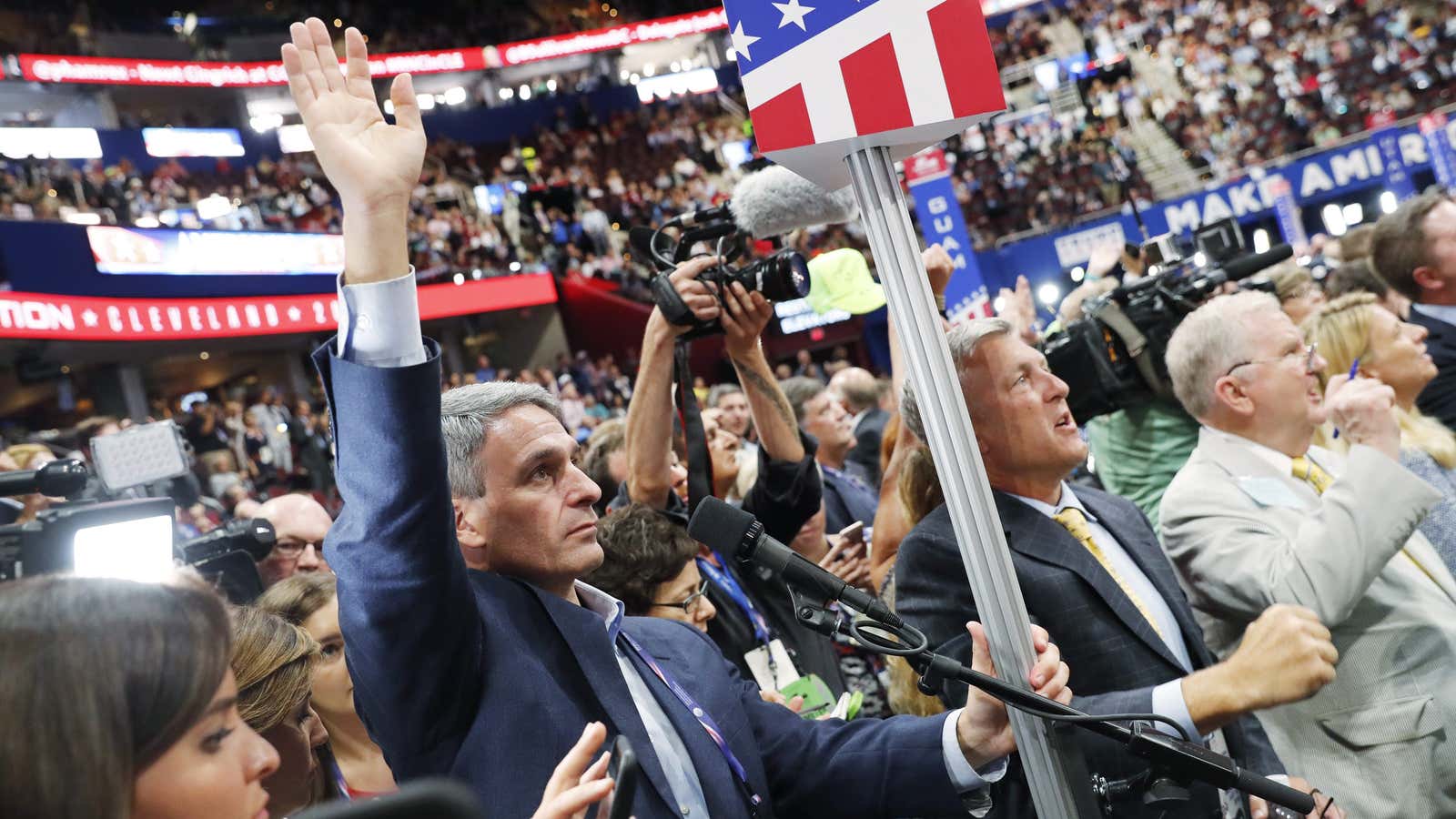Cleveland, Ohio
It wasn’t exactly the show of unity and enthusiasm that Donald Trump—or the Republican establishment—had wanted the convention to project.
This evening, as the convention chair, Paul Ryan, recorded each states’ votes for the nomination, delegates from a slew of states boycotted the convention floor, including Colorado, Iowa, Maine, Utah, and DC. Most of the Virginia delegation was nowhere to be seen.
Even well after Trump’s nomination had been officially secured, the drama wasn’t over. As the roll call vote drew to a close, Alaska’s party chairman accosted convention chairman Paul Ryan on the stage, challenging the fact that his state’s votes—which had gone 12 for Ted Cruz, 11 for Trump, and five for Marco Rubio—had been given entirely to Trump. RNC chair Reince Preibus ultimately overruled Alaska’s objections.
The reason why gets to the deepening rift in the Republican party. The rule that Preibus cited is one of a slew that govern the party, the convention, and the primary process. They passed this year and in 2012 and concentrate power in the hands of the RNC and the Republican elite, and weaken the clout of the rank-and-file party members who make up its grassroots, as Quartz explored in depth recently.
Erick Cordero said he and many of his fellow Alaska delegates were “very angry.”
“It’s important [to count our votes] because I’m here representing the wishes… of my fellow residents of Alaska. If they’re not going to respect that, then we might as well not be here at all,” says Cordero. “This is not about Trump. Our frustration is really with the RNC and their legal interpretation that we disagree with very strongly.”
The way those rules were decided are a source of resentment among the party’s grassroots—for instance, it’s reportedly why most of the Virginia delegation boycotted the roll call vote.
To the media and many onlookers, the rules that govern the convention—which are revised and voted on at the beginning of each new convention—seemed significant because changing them just so offered a possibility for letting another candidate challenge Trump for the nomination. That was spearheaded by a movement of delegates under the aegis of Free the Delegates, Never Trump, and sometimes Delegates Unbound. And indeed, Trump has made much of vanquishing “Never Trump,” the faction of Republican delegates bent on challenging his nomination at the convention.
But unseating Trump was the goal of only a small minority of those delegates who hoped to influence the rules-writing process to limit the power of the RNC. To these state party activists, the rules represent something else: the mechanism that balances power in selecting the nominee between the grassroots and the Washington Republican elite.
The resentment that roiled the convention floor yesterday and today comes largely from the fact that the the RNC poohbahs controlling the rules committee refused concessions to the grassroots, tightening even more rules that thwart activists from supporting alternative candidates. On top of that, when the chairman of the convention brought the rules package to the floor for the convention to vote on it, he ignored a petition brought by at least nine states (and possibly 11) to allow a roll call vote (this would let all 2,400-plus delegates vote as individuals, as opposed to the standard voice vote, which is essentially the clap-o-meter of parliamentary procedure).
This struggle for influence over the nomination process is clearly driving a wedge between the grassroots and the Republican establishment. In fact, chanting, screaming, throngs of delegates storming out of the arena, amid general resentment, is starting to become a quadrennial tradition for the Republican Party. A similar controversy blighted the convention in Tampa in 2012, after the RNC and Mitt Romney’s campaign pushed through sweeping changes to the rules in order to prevent upstart candidate Ron Paul, a darling of the grassroots, from getting his name on the ballot, and hence a prime-time speaking spot at the convention.
“I think overall the Ron Paul movement scared people who thought they were in a better position to make decisions for the party,” says Jackson Harvey, a delegate from Minnesota.
“I just tend to disagree with the people who want to concentrate power [in the hands of the establishment]. The way you do that is via representative government,” he adds. “The establishment always will have some amount of power—that’s what makes them the establishment. But shifting power toward them is dangerous.”
